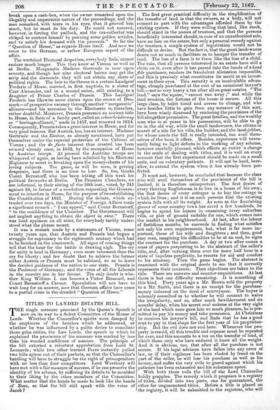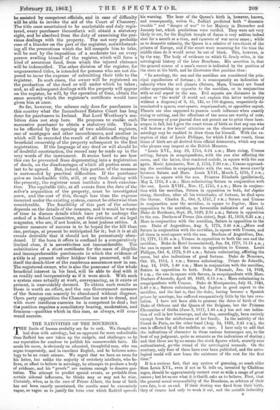TITLES TO LANDED ESTATES BILL.
F single measure promised by the Queen's Speech is rilw on its way to a Select Committee of the House of Lords. Whether the Chancellor's spirits were damped by the emptiness of the benches which he addressed, or whether he was influenced by a pelite desire to conciliate those gritu critics, the Law Lords, the speech in which he explained the provisions of his measure was marked by less than his wonted confidence of manner. The principle of the bill extorted a reluctant approbation from Lord St. Leonards ; while two other learned Peers instantly pulled two bills apiece out of their pockets, so that the Chancellor's bantling will have to struggle for the right of primogeniture with no less than four competitors. Lord Westbury will have met with a fair measure of success, if he can preserve the identity of his scheme, by suffering its details to be moulded to their liking by the other members of the Committee. What matter that the hands be made to look like the hands of Esau, so that the bill still speak with the' voice of Jacob ? The first great practical difficulty in the simplification of the transfer of land is that the owners, as a body, will not consent to part with the advantages aforded them by the existing system. If they were willing that land, like stock, should stand in the names of trustees, and that the persons beneficially interested should, in case of an unauthorized sale, have no lien on the estate, but only a personal remedy against the trustees, a simple system of registration would not be difficult to devise. But the fact is, that the great landowners desire not so much to facilitate as to hamper the transfer of land. The loss of a farm is to them like the loss of a-child. The rule, that all persons interested in an estate have still a claim on it, even after it has passed into the hands of a bond fide purchaser, renders its fraudulent alienation impossible, and this is precisely what constitutes its merit as an invest- ment in their eyes. This security is an incalculable advan- tage, cheaply purchased at the cost of tui occasional lawyer's bill,—not so very heavy a tax after all on great estates. "The land," says the squire, "cannot run away ;" and while the land remains, the fortune of the house is secure. All this large class, by habit timid and averse to change, and who have besides little to gain from any measure of this sort, have been wisely disarmed by rendering the provisions of the bill altogether permissive. The great families, and the wealthy man who is at peace in his possessions, will be able to go on in the old way, while the small landowners, the citizen in search of a site for his villa, the builder, and the land-jobber, for whose needs the bill is really intended, can avail them- selves of the boon it offers. Besides, experience will neces- sarily bring to light defects in the working of any scheme, however carefully planned, which effects so entire a change in the mode of dealing with titles and it is well on every account that the first experiment should be made on a small scale, and on voluntary patients. It will not be hard, here- after, to extend the system when it has already been per- fected.
It must not, however, be concluded that because the class who will avail themselves of the provisions of the bill is limited, it is therefore unimportant. The first desire of every thriving Englishman is to live in a house of his own.; the first desire of every cottager is to buy the cottage in which he lives ; and it is on such persons that the existing system falls with all its weight. As soon as the flourishing grocer of some country town has saved a few hundreds, he begins to spend his leisure in examining every suburban villa, or plot of ground suitable for one, which comes into the market in his neighbourhood. At last, after the labour of fastidious months, he succeeds in finding what satisfies not only his own requirements, but, what is far more im- portant, those of his wife and daughters ; and then, good easy man, imagining his difficulties to be at an end, he signs the contract for the purchase. A day or two after comes a mass of papers purporting to be the abstract of the seller's title, and, after turning them over for some half hour in a state of hopeless perplexity, he resorts for aid and comfort to his attorney. Then the game begins. ' The abstract is examined with the original deeds to see that it correctly represents their contents. Then objections are taken to the title. There are answers and counter-requisitions. At last there is but one difficulty remaining, it is something of this kind. Forty years ago a Mr. Brown sold the property to a Mr. Smith, and there is no receipt for the purchase- money indorsed on the deed of conveyance. The buyer is solemnly consulted as to whether he will consent to waive the irregularity, and so, after much bewilderment and six months' delay, when his secret soul sickens at the very sight of the land which once gave him so much pleasure, he is per- mitted to pay his money and take possession. At Christmas he receives his lawyer's bill, and finds that he has a good rent to pay in that shape for the first year of his proprietor- ship. But the evil does not end here. Whenever the pro- perty is resold, all this trouble and expense must be repeated for ever, and this amounts to a tax on the transfer of land, of which those only who have endured it know all the weight. And it is obvious, too, that after all the purchase is not secure. If his legal advisers have fallen into any error of law, or if their vigilance has been eluded by fraud on the part of the seller, he will lose his purchase as well as his money, and suffer the very evils to guard against which his patience has been exhausted and his substance spent. With both these evils the bill of the Lord Chancellor boldly grapples. The remedy which it proposes is a registry of titles, divided into two parts, one for guaranteed, the other for unguaranteed titles. Before a title is placed on the registry, it will be submitted to the registrar, who will be assisted by competent officials, and in case of difficulty will be able to invoke the aid of the Court of Chancery. The title once ascertained to be marketable and duly regis- tered, every purchaser thenceforth will obtain' a statutory right, and be absolved from the duty of examining the pre- vious dealings with the property. The not very probable case of a blunder on the part of the registrar, notwithstand- ing all the precautions which the bill compels him to take, will be met by the imposition of a moderate tax on every person availing himself of the register, which will form a kind of assurance fund, from which the injured claimant will be indemnified. The other division of the register, for unguaranteed titles, is intended for persons who are not dis- posed to incur the expense of submitting their title to the registrar. In such cases, the owner will be registered on the production of the deed or will under which he takes ; and, as all subsequent dealings with the property will appear on the register, he will, by the operation of time, obtain the same security which the registrar's certificate would have given him at once. So far, however, the scheme only does for purchasers in this country what the Incumbered Estates Court has long done for purchasers in Ireland. But Lord Westbury's am- bition does not stop here. He proposes to enable each successive purchaser to obtain a statutory title. This is to be effected by the opening of two additional registers, one of mortgages and other incumbrances, and another in which will be recorded the result of all deeds affecting the beneficial ownership of the property subsequent to the first registration. If the language of any deed or will should be of doubtful construction, the record may be made up in the very words of the instrument. It seems hard to see how this can be prevented from degenerating into a registration of deeds, on the disadvantages of which all parties seem at last to be agreed. But, indeed, this portion of the measure is surrounded by practical difficulties. If the purchaser gains an indefeasible title, still, at any fresh dealing with the property, the registrar must institute a fresh examina- tion. The equitable title, at all events frem the date of the seller's acquisition of the property, must be investigated anew, and the cost of this, though less than the expense incurred under the existing System, cannot be otherwise than considerable. The feasibility of this part of the scheme depends on the details of the measure, and it would be waste of time to discuss details which have yet to undergo the ordeal of a Select Committee, and the criticism of six legal magnates, who are, if not hostile, at least jealous critics. A greater measure of success is to be hoped for the bill than can, perhaps, at present be anticipated for it; but it is at all events desirable that it should not be prematurely aban- doned. If the boon it offers is confined to a comparatively limited class, it is nevertheless not inconsiderable. The substitution of a short certificate for the mass of illegible and incomprehensible parchments in which the evidence of a title is at present rather hidden than preserved, will be itself the death-blow of the cumbrous assurances now in use. The registered owner, who is also the possessor of the whole beneficial interest in his land, will be able to deal with it as readily and inexpensively as if it were stock-. With each a system once actually at work, conveyancing, as it exists at present, is unavoidably doomed. To obtain such results as these is worth an effort, and the one Government measure of the Session can scarcely be abandoned without disgrace. Open party opposition the Chancellor has not to dread, and with more insidious enemies he i,s competent to deal ; but the position requires a conciliatory bearing, moderation, and firmness-qualities which in this case, as always, will com- mand success.,































 Previous page
Previous page